Order of Draw and Tests
This post may contain affiliate links. I may be compensated if you make a purchase through one of the links, at no additional cost to you. Please see full disclosure for more information.
How to remember the order of draw and what tubes are used for what blood tests?
These are the common venipuncture-related questions among nursing students and aspiring phlebotomists.
In total, there are 8-12 different blood collection tubes for different tests. The tubes have different top color, additives and purposes.
Laboratory Blood Test Tubes Colors and Use
Before we discuss the proper order of draw, let's discuss first what tubes are used for what blood tests:
Disclaimer: The brand of blood tubes pictured below is BD . We are not paid nor sponsored by BD for this post. We are not in the position to recommend BD as well. The picture taken and featured below are for educational purposes only.
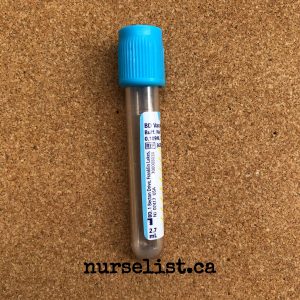
Light Blue Tube
Additive: 3.2% buffered Sodium citrate
Purpose of Additive: Acts as an anticoagulant by binding to calcium in blood to prevent clotting.
Common Tests: Prothrombin Time (PT), Activated Partial Thromboplastin Time (APTT/ PTT), Thrombin Time (TT), Fibrinogen Degradation Products (FDP), Fibrinogen, D-Dimer and Factor Assays
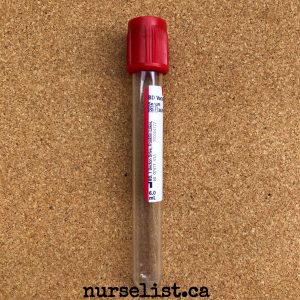
Red Tube
Additive: Silica particles
Purpose of Additive: Serves as a clot activator
Common Tests: Cryoglobulin, Complement pathways (Alternative, Classical and MBL)

Serum Separator Tube (SST)
Additive: Clot activator and separating gel
Purpose of Additive: After centrifugation, the separating gel serves as a barrier between the serum and the clot.
Common Tests: Serology, Immunology and Endocrine tests
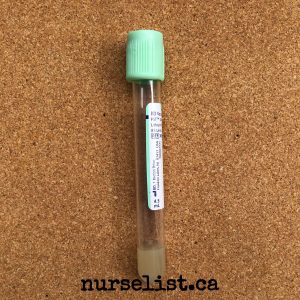
Mint Green Tube
Additive: Lithium heparin and separating gel
Purpose of Additive: Inhibits coagulation by inactivating thrombin and thromboplastin to produce a plasma or whole blood sample
Common Tests: Ammonia, Troponin I and Parathyroid hormone
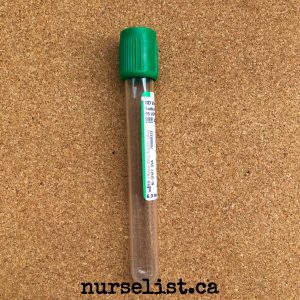
Green Tube
Additive: Sodium heparin
Purpose of Additive: Inhibits thrombin formation to prevent clotting
Common Tests: Cathecolamines, ICA, Lactate
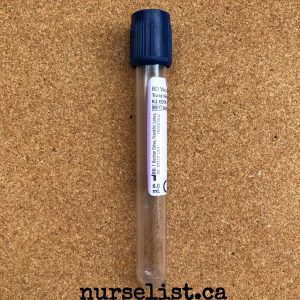
Dark Blue Tube
Additive: K2 EDTA
Purpose of Additive: Forms calcium salts to prevent coagulation. Tube is designed to prevent risk of trace metal contamination.
Common Tests: Toxicology, drug level and trace element testing (lead, copper, mercury and zinc)
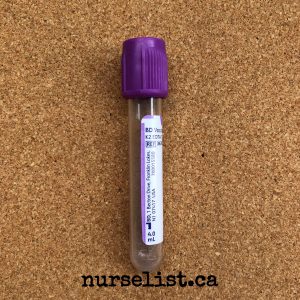
Lavender Tube
Additive: K2 EDTA
Purpose of Additive: Binds to calcium to prevent blood clotting
Common Tests: Hematology, crossmatching, ACTH and renin

Practice your skills in doing blood draws with this useful kit for students. Check it out here.
Order of Draw for Blood Tubes

Considering the most common tubes used by nurses for venipuncture, here is the proper order of blood draw:
- aerobic blood culture
- anaerobic blood culture
- light blue
- red
- gold (SST)
- mint green
- green
- dark blue
- lavender.
It is important to take the blood cultures first to prevent contamination from the additives of the other blood tubes. The aerobic bottle should also be drawn first to prevent air contamination in the anaerobic bottle if you are using a butterfly needle.
Following the proper order of blood draw is essential in ensuring accurate blood test results. If it will not be followed, some tests may produce false-positive result. For example, drawing lavender tube before gold or SST tube will spike potassium levels in the SST tube, thereby producing false hyperkalemia result.

Get these handy badge reference cards to have a quick look on normal laboratory values anywhere, anytime. Check it out here .
How to Remember the Order of Draw?
Just remember this and picture it out in your mind when remembering the order of blood tubes:
In the sky , the burning hot sun shines over the young tree and the bushes of blue and lavender daisies.
Share this technique on how to remember the order of draw with your classmates/colleagues!
Also Read: 7 Common Mistakes of Nurses When Doing Blood Draws

Heavy duty tourniquet bands with quick-release buckle, check it out here .
How to Remember the Order of Draw

Source: https://nurselist.ca/order-of-draw-what-tubes-are-used-for-what-blood-tests/
0 Response to "Order of Draw and Tests"
Post a Comment